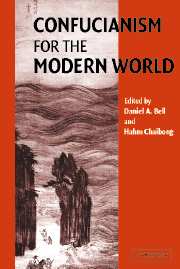Book contents
- Frontmatter
- Contents
- List of Contributing Authors
- Acknowledgments
- Editors' Note
- Introduction: The Contemporary Relevance of Confucianism
- PART I CONFUCIAN PERSPECTIVES ON DEMOCRACY
- 1 Constitutionalism, Confucian Civic Virtue, and Ritual Propriety
- 2 The Challenge of Accountability: Implications of the Censorate
- 3 Confucian Democrats in Chinese History
- 4 Mutual Help and Democracy in Korea
- 5 A Pragmatist Understanding of Confucian Democracy
- 6 The Case for Moral Education
- PART II CONFUCIAN PERSPECTIVES ON CAPITALISM
- PART III CONFUCIAN PERSPECTIVES ON LAW
- Epilogue: Why Confucius Now?
- Index
5 - A Pragmatist Understanding of Confucian Democracy
Published online by Cambridge University Press: 28 August 2009
- Frontmatter
- Contents
- List of Contributing Authors
- Acknowledgments
- Editors' Note
- Introduction: The Contemporary Relevance of Confucianism
- PART I CONFUCIAN PERSPECTIVES ON DEMOCRACY
- 1 Constitutionalism, Confucian Civic Virtue, and Ritual Propriety
- 2 The Challenge of Accountability: Implications of the Censorate
- 3 Confucian Democrats in Chinese History
- 4 Mutual Help and Democracy in Korea
- 5 A Pragmatist Understanding of Confucian Democracy
- 6 The Case for Moral Education
- PART II CONFUCIAN PERSPECTIVES ON CAPITALISM
- PART III CONFUCIAN PERSPECTIVES ON LAW
- Epilogue: Why Confucius Now?
- Index
Summary
JOHN DEWEY'S SECOND ASIAN MISSION
A PRAGMATIC PROPOSAL
The widespread skepticism of both Asians and Westerners with respect to the realization of a Confucian-style democracy is rooted in two allied convictions. First, it is too much to expect that democratic institutions will be easily grown from seeds already present in Confucian soil. And second, the present institutional forms of Asian Confucianism and Western democracies are sufficiently distinct to preclude a marrying of the two. With respect to the importation of Western democratic institutions, there is little hope of detaching desirable democratic practices from the questionable economic and cultural forces that, in North Atlantic democracies, have too often mitigated the effectiveness of those practices. In sum, while there might be a strong interest on the part of many Confucian societies in adopting a democratic baby, there is justifiable concern about the continuing quality of its bathwater.
We believe that these skeptics have a strong case. Late-Western democracies are themselves fallen-away versions of their originally intended forms. Unquestionably, the importation of Western democratic institutions by non-Western countries has required the acceptance of economic and cultural forces that have little to do with democracy per se. Indeed, in instance after instance,no sooner is the Trojan Horse rolled through the gates than rationalized social, economic, and technological elements have escaped from it to do their work.
- Type
- Chapter
- Information
- Confucianism for the Modern World , pp. 124 - 160Publisher: Cambridge University PressPrint publication year: 2003
- 11
- Cited by



